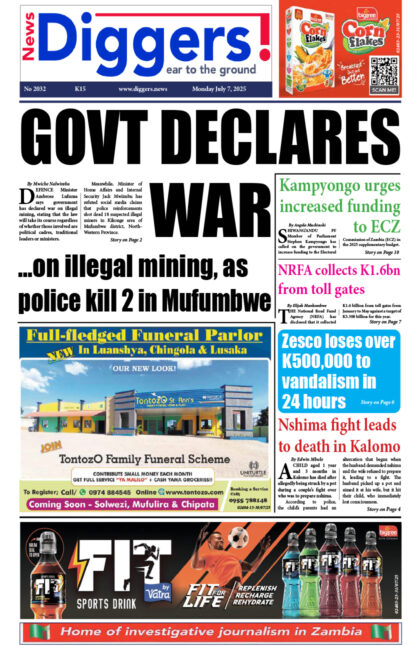The deteriorating Turkish economy raises uncertainty surrounding the Zambian government’s plan to refinance the country’s US $750 million Eurobond using an unnamed company from that country, says the Economics Association of Zambia (EAZ).
And the Zambia Chamber of Commerce and Industry (ZACCI) has appealed to government to disclose the terms and conditions under the proposed refinancing deal so that stakeholders can know how much it will cost.
Turkey entered a full-blown financial meltdown last Friday, sending tremors through global markets, after President Recep Tayyip Erdoğan declared his refusal to bow to U.S. political demands and market pressures, Bloomberg reports.
Following this development, the Turkish lira plunged as much as 17 per cent on Friday alone, bringing its loss for the year to 42 per cent and raising the spectre of contagion into Europe and across other emerging markets.
According to Bloomberg, the trigger for this latest economic downturn was U.S. sanctions for Turkey’s imprisonment of an American pastor.
Some investors say the US $900 billion economy was already headed toward a cliff, and only needed a push.
Bloomberg further reported that some Turkish companies operating in that country are saddled with hundreds of billions of dollars in foreign debt.
Reacting to the development, EAZ president Dr Lubinda Haabazoka said the economic downturn being experienced in Turkey raised renewed uncertainty amidst that country’s looming economic crisis.
“Of course, that development pushes into uncertainty any Turkish company’s business because it means that most businesses, especially those centred around the Turkish economy, are going to post losses as a result of that. But we just hope that, that is not going to have a negative impact on the purported deal with the Zambian government,” Dr Haabazoka told News Diggers! in an interview, Monday.
He also noted that cost of refinancing Zambia’s sovereign bond remained a concern.
“The other issue is that the terms of the refinancing needs to be very favourable for us. The only way we can achieve that is to get a loan that is way above 10 years maturity, otherwise, if we get a loan of 10 years, we might pay a high price in terms of interest payments,” Dr Haabazoka, who is also director at the Graduate School of Business at UNZA, added.
“So, those that are going to go and negotiate, first of all, they should ensure that the money is tied and made available to us at the agreed time to avoid a default. Two; to ensure that the terms are very favourable to Zambia.”
He further called on the loan negotiators to ensure the Turkish government had an equity stake to hedge against uncertainty and volatility prevailing in that economy.
“Looking at the Turkish economy, they are quite better than us. But their economy goes through a lot of uncertainty because of their geolocation – near Syria, Iraq and Iran. Also, their dependence on the oil business in that area. Government should advise the Turkish government to have equity in the loan that they are going to provide to Zambia because it becomes very easy to restructure, re-negotiate a loan with government rather than a private entity,” Dr Haabazoka advised.
“In terms of interest, it is very true that, if the interest [rate] at which we are going to borrow is going to be floating, we might end up paying high interest on the loan because of the uncertainty surrounding the Turkish economy that’s why we need to have fixed interest [rate] on our loan. Although that will be very difficult to achieve.”
And ZACCI president Michael Nyirenda appealed to government to disclose the terms and conditions of the proposed loan agreement.
“We [ZACCI] have not interrogated that issue in detail for one reason; we do not have the details and government has not provided that,” said Nyirenda in a separate interview.
“We need to understand at what cost are these commercial loans to us and also, what is our capability in order to repay?”
Last month, President Edgar Lungu hinted that an unnamed Turkish company had expressed interest in refinancing Zambia’s US $750 million Eurobond during an unprecedented visit by his Turkish counterpart at State House.



















